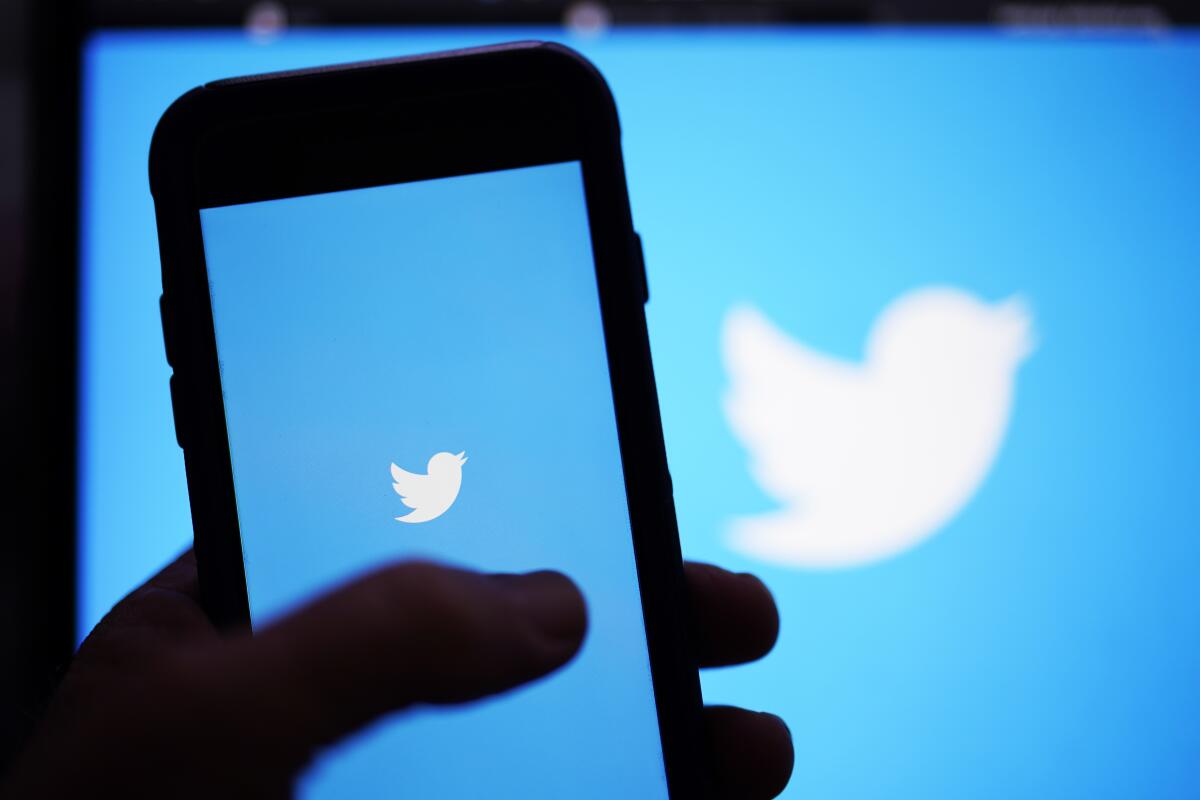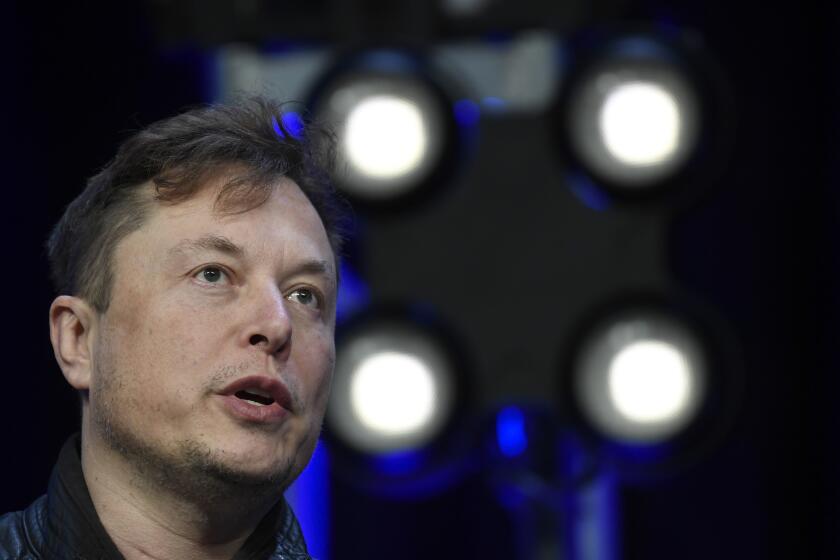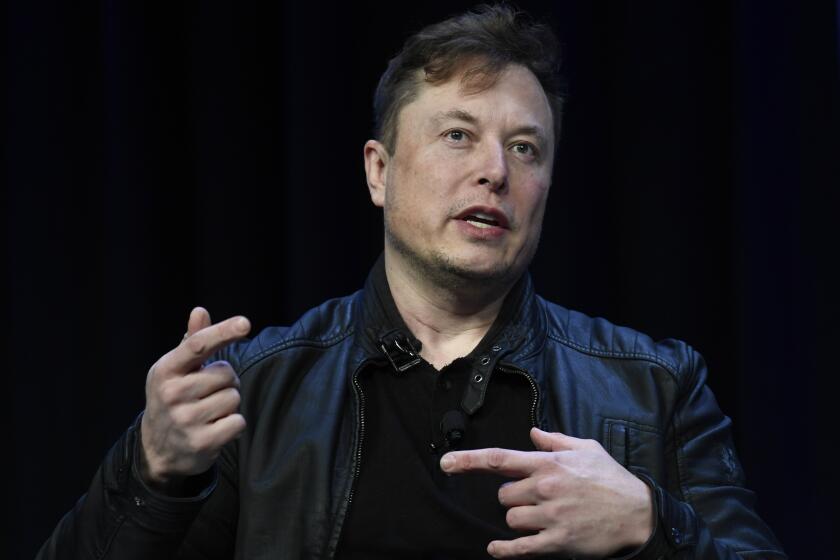Column: Twitter used to correct the narrative. Now it writes the narrative

- Share via
“What is the difference between a hockey mom and a pit bull?” the president of the United States asked 10 years ago at the White House Correspondents’ Dinner. “A pit bull is delicious.”
Of course, to echo E.B. White: Explaining a joke is like dissecting a frog. You understand it better but the frog dies in the process.
But that’s all right, because I bring up this decade-old riff to explain the joke that is Twitter.
Musk is not a benevolent actor, but he probably can’t wreck Twitter without wrecking what he really cares about: $TWTR.
The “hockey moms” reference was a shot at Sarah Palin, who had famously joked that the difference between pit bulls and hockey moms was “lipstick.” But Palin wasn’t the actual butt of Barack Obama’s joke — he was. Two weeks earlier, Daily Caller blogger Jim Treacher posted an article noting that Obama admitted in his memoir “Dreams From My Father” that he had eaten dog when he was visiting family in Indonesia.
Treacher’s point was to push back on the combined obsession of the Beltway media and the Obama campaign with an old story about how Mitt Romney — Obama’s 2012 opponent — used to go on driving family vacations with his dog in a kennel on the roof. New York Times columnist Gail Collins alone mentioned the incident at least 70 times.
But neither the Times nor any other mainstream outlet had mentioned this literal man-bites-dog story, despite the fact it had become a massively viral political meme, thanks primarily to Twitter (there was even a “Downfall” video, “Hitler Discovers Obama Ate a Dog”).
And yet Obama felt he had to address, and perhaps defuse, the firestorm.
We saw it as a huge victory. The right-wing bloggers — including yours truly — who responded to nearly every Democratic attack on Romney with “yeah, but Obama ate a dog” were just having fun and pointing out that the mainstream media’s monopoly on which dumb controversies should be taken seriously was over. Twitter offered a correction to the asymmetric advantage the mainstream media had over the narrative.
And, back then, I loved Twitter for it.
The times have changed. Now, Twitter — and social media generally — is the narrative. And as Jonathan Haidt recently argued in the Atlantic, this change has led to the stupidification of much of American life. Because virality is the currency of the realm and nothing fuels virality more than outrage, Twitter is an open spigot of outrage, commodifying mob anger into a slurry that spills across the internet and cable news and ultimately back to Twitter.
There are journalists who spend their entire day covering bad tweets as if they’re news and others who search Twitter for confirmation that those bad tweets are based on prefabricated theses. Of course, they always find what they’re looking for.
By taking the company private, Musk will remove federal oversight of Twitter. Curbing racism and harassment on Twitter could become difficult.
When we tweeted our “Obama ate a dog” jokes, the president responded with some jokes of his own. Now the joke is on us. Under Donald Trump, covering the presidency and covering the president’s Twitter feed were two sides of the same coin. His presidency brought in, or taught, a whole generation of young Republicans to treat Twitter (and cable TV) not merely as if it matters more than governing, but that it is governing. For some meme bros, “owning the libs” on Twitter is statesmanship.
Democrats arguably have an even bigger problem. For the right, Twitter is still the battle space for insurgency against the establishment. For the left, it is the establishment. Twitter is overwhelmingly liberal — which explains much of the liberal panic over Elon Musk buying it. According to Pew, 10% of users generate 92% of all tweets, and 7 out of 10 of these users are liberal. Using this data, Brian Riedl, a budget and tax expert, calculated last year that if Twitter were a congressional district, it would have a Partisan Voter Index (PVI) of D+43. Today, that would tie it with Washington, the most liberal district in the country.
Because Twitter reinforces ideological conformity by swarming dissenters, elite liberal journalists and policymakers alike confuse consensus among themselves on Twitter with popular consensus. Joe Biden fancies himself a moderate, but his administration takes its cues from a platform that might as well be a poll of Democratic primary voters in D.C.
I still use Twitter. But it no longer brings much joy. Having a sane conversation there is a bit like trying to play chess in the middle of a mosh pit. Ironically, one of the few things I do enjoy is tweeting about my dogs (and I don’t mean recipes) — in part because dogs don’t care about Twitter.
More to Read
A cure for the common opinion
Get thought-provoking perspectives with our weekly newsletter.
You may occasionally receive promotional content from the Los Angeles Times.













